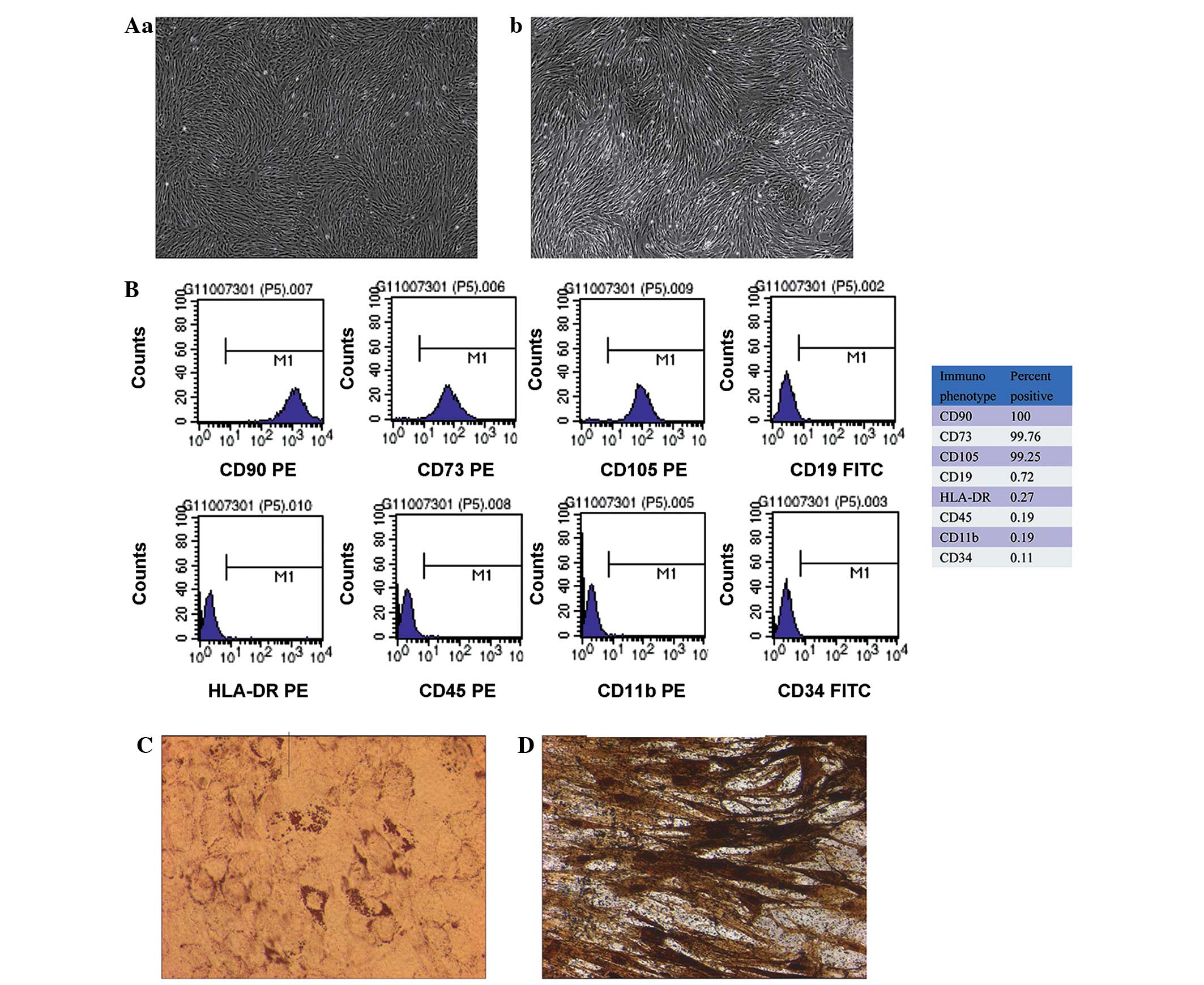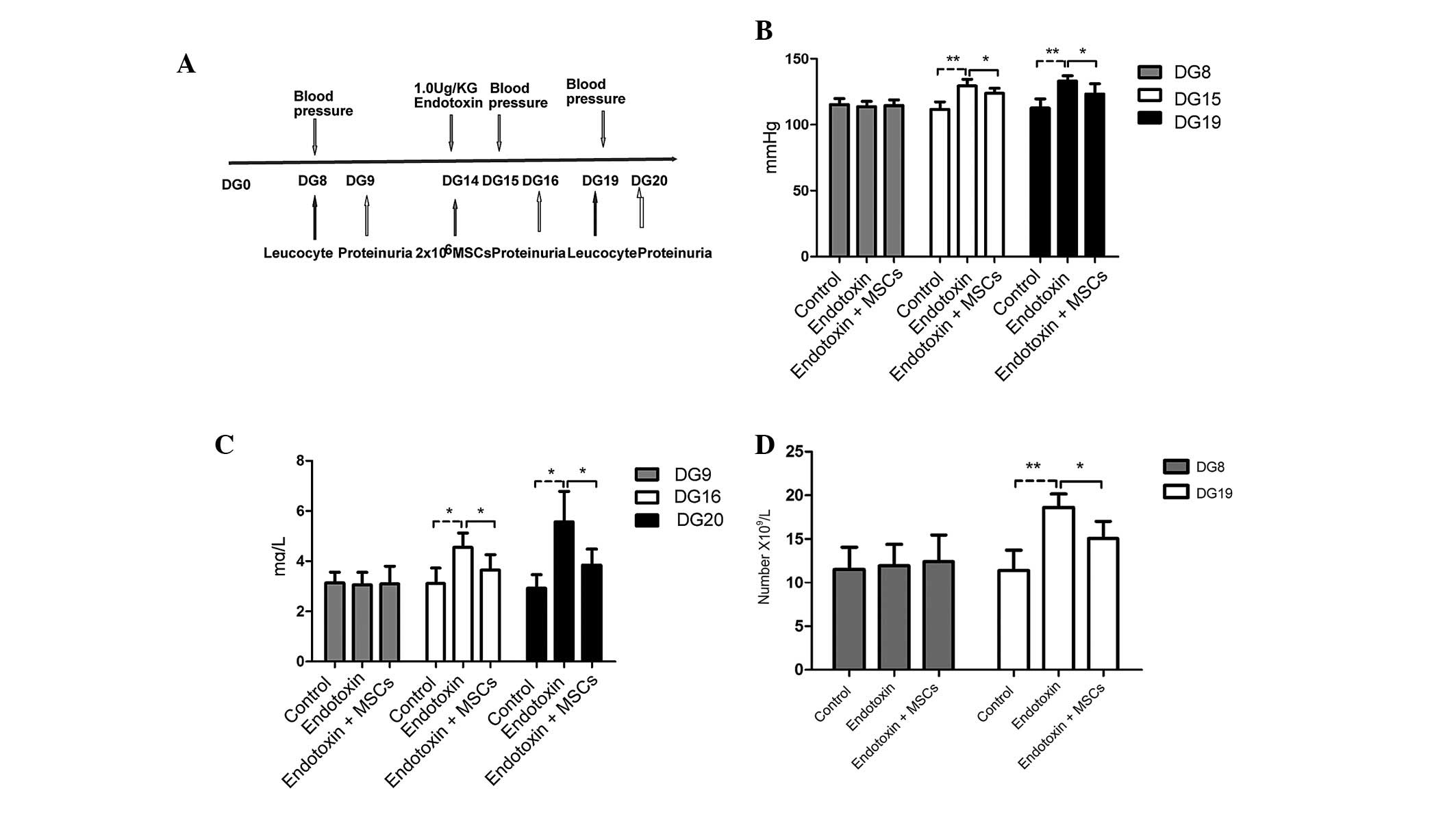|
1
|
Chesley LC: Hypertensive disorders in
pregnancy. J Nurse Midwifery. 30:99–104. 1985. View Article : Google Scholar : PubMed/NCBI
|
|
2
|
Kanasaki K and Kalluri R: The biology of
preeclampsia. Kidney Int. 76:831–837. 2009. View Article : Google Scholar : PubMed/NCBI
|
|
3
|
Goldman-Wohl DS and Yagel S: Examination
of distinct fetal and maternal molecular pathways suggests a
mechanism for the development of preeclampsia. J Reprod Immunol.
76:54–60. 2007. View Article : Google Scholar : PubMed/NCBI
|
|
4
|
Conrad KP and Benyo DF: Placental
cytokines and the pathogenesis of preeclampsia. Am J Reprod
Immunol. 37:240–249. 1997. View Article : Google Scholar : PubMed/NCBI
|
|
5
|
Gulati R: Raised serum TNF-alpha, blood
sugar and uric acid in preeclampsia in third trimester of
pregnancy. JNMA J Nepal Med Assoc. 44:36–38. 2005.PubMed/NCBI
|
|
6
|
Peraçoli MT, Bannwart CF, Cristofalo R, et
al: Increased reactive oxygen species and tumor necrosis
factor-alpha production by monocytes are associated with elevated
levels of uric acid in pre-eclamptic women. Am J Reprod Immunol.
66:460–467. 2011. View Article : Google Scholar : PubMed/NCBI
|
|
7
|
Irani RA, Zhang Y, Zhou CC, et al:
Autoantibody-mediated angiotensin receptor activation contributes
to preeclampsia through tumor necrosis factor-alpha signaling.
Hypertension. 55:1246–1253. 2010. View Article : Google Scholar : PubMed/NCBI
|
|
8
|
Parrish MR, Murphy SR, Rutland S, et al:
The effect of immune factors, tumor necrosis factor-alpha, and
agonistic autoantibodies to the angiotensin II type I receptor on
soluble fms-like tyrosine-1 and soluble endoglin production in
response to hypertension during pregnancy. Am J Hypertens.
23:911–916. 2010. View Article : Google Scholar : PubMed/NCBI
|
|
9
|
Li Z, Zhang Y, Ying Ma J, et al:
Recombinant vascular endothelial growth factor 121 attenuates
hypertension and improves kidney damage in a rat model of
preeclampsia. Hypertension. 50:686–692. 2007. View Article : Google Scholar : PubMed/NCBI
|
|
10
|
Friedenstein AJ, Piatetzky-Shapiro II and
Petrakova KV: Osteogenesis in transplants of bone marrow cells. J
Embryol Exp Morphol. 16:381–390. 1966.PubMed/NCBI
|
|
11
|
Williams AR and Hare JM: Mesenchymal stem
cells: Biology, pathophysiology, translational findings, and
therapeutic implications for cardiac disease. Circ Res.
109:923–940. 2011. View Article : Google Scholar : PubMed/NCBI
|
|
12
|
Kode JA, Mukherjee S, Joglekar MV and
Hardikar AA: Mesenchymal stem cells: Immunobiology and role in
immunomodulation and tissue regeneration. Cytotherapy. 11:377–391.
2009. View Article : Google Scholar : PubMed/NCBI
|
|
13
|
Pullamsetti SS, Schermuly R, Ghofrani A,
et al: Novel and emerging therapies for pulmonary hypertension. Am
J Respir Crit Care Med. 189:394–400. 2014. View Article : Google Scholar : PubMed/NCBI
|
|
14
|
Nishida S, Endo N, Yamagiwa H, et al:
Number of osteoprogenitor cells in human bone marrow markedly
decreases after skeletal maturation. J Bone Miner Metab.
17:171–177. 1999. View Article : Google Scholar : PubMed/NCBI
|
|
15
|
Mueller SM and Glowacki J: Age-related
decline in the osteogenic potential of human bone marrow cells
cultured in three-dimensional collagen sponges. J Cell Biochem.
82:583–590. 2001. View
Article : Google Scholar : PubMed/NCBI
|
|
16
|
Wang HS, Hung SC, Peng ST, et al:
Mesenchymal stem cells in the Wharton's jelly of the human
umbilical cord. Stem Cells. 22:1330–1337. 2004. View Article : Google Scholar : PubMed/NCBI
|
|
17
|
Fu YS, Cheng YC, Lin MY, et al: Conversion
of human umbilical cord mesenchymal stem cells in Wharton's jelly
to dopaminergic neurons in vitro: Potential therapeutic application
for Parkinsonism. Stem Cells. 24:115–124. 2006. View Article : Google Scholar : PubMed/NCBI
|
|
18
|
Yang CC, Shih YH, Ko MH, et al:
Transplantation of human umbilical mesenchymal stem cells from
Wharton's jelly after complete transection of the rat spinal cord.
PLoS One. 3:e33362008. View Article : Google Scholar : PubMed/NCBI
|
|
19
|
Moodley Y, Atienza D, Manuelpillai U, et
al: Human umbilical cord mesenchymal stem cells reduce fibrosis of
bleomycin-induced lung injury. Am J Pathol. 175:303–313. 2009.
View Article : Google Scholar : PubMed/NCBI
|
|
20
|
Faas MM, Schuiling GA, Baller JF, et al: A
new animal model for human preeclampsia: Ultra-low-dose endotoxin
infusion in pregnant rats. Am J Obstet Gynecol. 171:158–164. 1994.
View Article : Google Scholar : PubMed/NCBI
|
|
21
|
Faas MM, Broekema M, Moes H, et al:
Altered monocyte function in experimental preeclampsia in the rat.
Am J Obstet Gynecol. 191:1192–1198. 2004. View Article : Google Scholar : PubMed/NCBI
|
|
22
|
Sacks GP, Studena K, Sargent K and Redman
CW: Normal pregnancy and preeclampsia both produce inflammatory
changes in peripheral blood leukocytes akin to those of sepsis. Am
J Obstet Gynecol. 179:80–86. 1998. View Article : Google Scholar : PubMed/NCBI
|
|
23
|
González MA, Gonzalez-Rey E, Rico L, et
al: Treatment of experimental arthritis by inducing immune
tolerance with human adipose-derived mesenchymal stem cells.
Arthritis Rheum. 60:1006–1019. 2009. View Article : Google Scholar : PubMed/NCBI
|
|
24
|
Gonzalez-Rey E, Anderson P, González MA,
et al: Human adult stem cells derived from adipose tissue protect
against experimental colitis and sepsis. Gut. 58:929–939. 2009.
View Article : Google Scholar : PubMed/NCBI
|
|
25
|
Zhang J, Li Y, Chen J, et al: Human bone
marrow stromal cell treatment improves neurological functional
recovery in EAE mice. Exp Neurol. 195:16–26. 2005. View Article : Google Scholar : PubMed/NCBI
|
|
26
|
Tuli R, Tuli S, Nandi S, et al:
Characterization of multipotential mesenchymal progenitor cells
derived from human trabecular bone. Stem Cells. 21:681–693. 2003.
View Article : Google Scholar : PubMed/NCBI
|
|
27
|
Zuk PA, Zhu M, Mizuno H, et al:
Multilineage cells from human adipose tissue: Implications for
cell-based therapies. Tissue Eng. 7:211–228. 2001. View Article : Google Scholar : PubMed/NCBI
|
|
28
|
Fukuchi Y, Nakajima H, Sugiyama D, et al:
Human placenta-derived cells have mesenchymal stem/progenitor cell
potential. Stem Cells. 22:649–658. 2004. View Article : Google Scholar : PubMed/NCBI
|
|
29
|
In't Anker PS, Scherjon SA, der Keur
Kleijburg-van C, et al: Isolation of mesenchymal stem cells of
fetal or maternal origin from human placenta. Stem Cells.
22:1338–1345. 2004. View Article : Google Scholar : PubMed/NCBI
|
|
30
|
Hu Y, Liao L, Wang Q, et al: Isolation and
identification of mesenchymal stem cells from human fetal pancreas.
J Lab Clin Med. 141:342–349. 2003. View Article : Google Scholar : PubMed/NCBI
|
|
31
|
Bieback K, Kern S, Klüter H and Eichler H:
Critical parameters for the isolation of mesenchymal stem cells
from umbilical cord blood. Stem Cells. 22:625–634. 2004. View Article : Google Scholar : PubMed/NCBI
|
|
32
|
Lee OK, Kuo TK, Chen WM, Lee KD, Hsieh SL
and Chen TH: Isolation of multipotent mesenchymal stem cells from
umbilical cord blood. Blood. 103:1669–1675. 2004. View Article : Google Scholar : PubMed/NCBI
|
|
33
|
Han YF, Tao R, Sun TJ, et al: Optimization
of human umbilical cord mesenchymal stem cell isolation and culture
methods. Cytotechnology. 65:819–827. 2013. View Article : Google Scholar : PubMed/NCBI
|
|
34
|
Dominici M, Le Blanc K, Mueller I, et al:
Minimal criteria for defining multipotent mesenchymal stromal
cells. The International Society for Cellular Therapy position
statement. Cytotherapy. 8:315–317. 2006. View Article : Google Scholar : PubMed/NCBI
|
|
35
|
Conrad KP, Miles TM and Benyo DF:
Circulating levels of immunoreactive cytokines in women with
preeclampsia. Am J Reprod Immunol. 40:102–111. 1998. View Article : Google Scholar : PubMed/NCBI
|
|
36
|
Zenclussen AC, Fest S, Joachim R, et al:
Introducing a mouse model for pre-eclampsia: Adoptive transfer of
activated Th1 cells leads to pre-eclampsia-like symptoms
exclusively in pregnant mice. Eur J Immunol. 34:377–387. 2004.
View Article : Google Scholar : PubMed/NCBI
|
|
37
|
Redman CWG, Sacks GP and Sargent IL:
Preeclampsia: An excessive maternal inflammatory response to
pregnancy. Am J Obstet Gynecol. 180:499–506. 1999. View Article : Google Scholar : PubMed/NCBI
|
|
38
|
Shi Y, Hu G, Su J, et al: Mesenchymal stem
cells: A new strategy for immunosuppression and tissue repair. Cell
Res. 20:510–518. 2010. View Article : Google Scholar : PubMed/NCBI
|
|
39
|
Carter D, Tyrell A, Bubnic S, et al:
Characterization of MSC potential to treat GVHD using molecular
markers linked to MSC-mediated immunosuppression in vitro. Blood.
106:160b2005.
|
|
40
|
Gupta N, Su X, Popov B, et al:
Intrapulmonary delivery of bone marrow-derived mesenchymal stem
cells improves survival and attenuates endotoxin-induced acute lung
injury in mice. J Immunol. 179:1855–1863. 2007. View Article : Google Scholar : PubMed/NCBI
|
|
41
|
Rafei M, Campeau PM, Aguilar-Mahecha A, et
al: Mesenchymal stromal cells ameliorate experimental autoimmune
encephalomyelitis by inhibiting CD4 Th17 T cells in a CC chemokine
ligand 2-dependent manner. J Immunol. 182:5994–6002. 2009.
View Article : Google Scholar : PubMed/NCBI
|

















